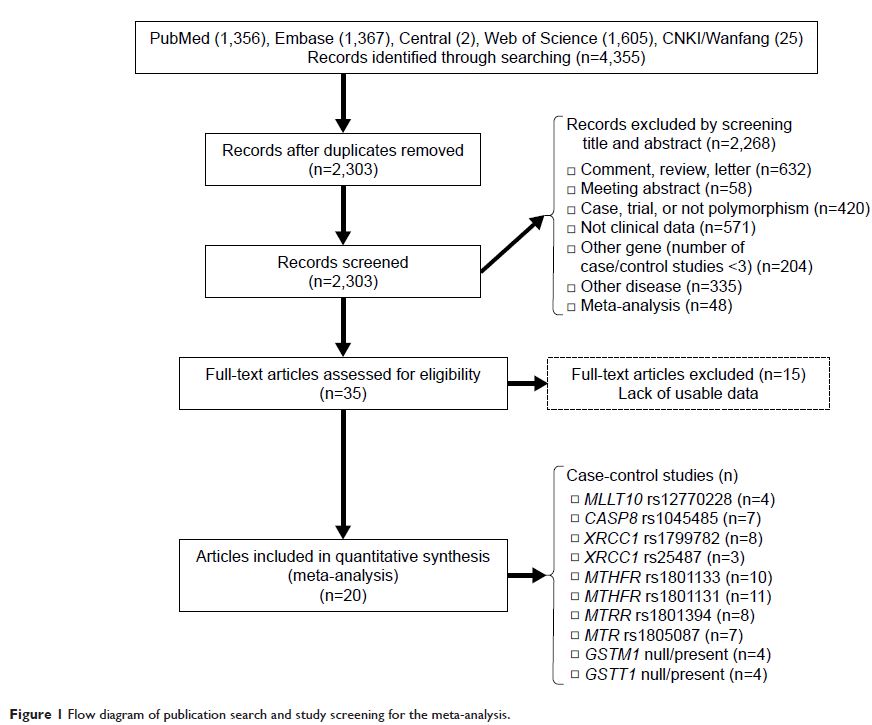9 0 5 7 8
论文已发表
注册即可获取德孚的最新动态
IF 收录期刊
- 2.6 Breast Cancer (Dove Med Press)
- 3.9 Clin Epidemiol
- 3.3 Cancer Manag Res
- 3.9 Infect Drug Resist
- 3.6 Clin Interv Aging
- 4.8 Drug Des Dev Ther
- 2.8 Int J Chronic Obstr
- 8.0 Int J Nanomed
- 2.3 Int J Women's Health
- 3.2 Neuropsych Dis Treat
- 4.0 OncoTargets Ther
- 2.2 Patient Prefer Adher
- 2.8 Ther Clin Risk Manag
- 2.7 J Pain Res
- 3.3 Diabet Metab Synd Ob
- 4.3 Psychol Res Behav Ma
- 3.4 Nat Sci Sleep
- 1.9 Pharmgenomics Pers Med
- 3.5 Risk Manag Healthc Policy
- 4.5 J Inflamm Res
- 2.3 Int J Gen Med
- 4.1 J Hepatocell Carcinoma
- 3.2 J Asthma Allergy
- 2.3 Clin Cosmet Investig Dermatol
- 3.3 J Multidiscip Healthc

基因变异和脑膜瘤风险增加: 一项更新的综合分析
Authors Han X, Wang W, Wang L, Wang X, Li G
Received 13 December 2016
Accepted for publication 22 February 2017
Published 28 March 2017 Volume 2017:10 Pages 1875—1888
DOI https://doi.org/10.2147/OTT.S130147
Checked for plagiarism Yes
Review by Single-blind
Peer reviewers approved by Dr Colin Mak
Peer reviewer comments 2
Editor who approved publication: Dr XuYu Yang
Purpose: Various genetic variants have been reported to be linked to
an increased risk of meningioma. However, no confirmed conclusion has been
obtained. The purpose of the study was to investigate potential
meningioma-associated gene polymorphisms, based on published evidence.
Materials and methods: An updated meta-analysis was performed in September
2016. After electronic database searching and study screening, we selected
eligible case-control studies and extracted data for meta-analysis, using
Mantel–Haenszel statistics. P -values, pooled odds ratios
(ORs), and 95% confidence intervals were calculated.
Results: We finally selected eight
genes with ten polymorphisms: MLLT10 rs12770228, CASP8 rs1045485, XRCC1 rs1799782, rs25487, MTHFR rs1801133, rs1801131, MTRR rs1801394, MTR rs1805087, GSTM1 null/present, and GSTT1 null/present. Results of meta-analyses
showed that there was increased meningioma risk in case groups under all models
of MLLT10 rs12770228 (all OR >1, P <0.001),
compared with control groups. Similar results were observed under the allele,
homozygote, dominant, and recessive models of MTRR rs1801394 (all OR >1, P <0.05), and the heterozygote
and dominant models of MTHFR rs1801131
in the Caucasian population (all OR >1, P <0.05). However, no
significantly increased meningioma risks were observed for CASP8 rs1045485, XRCC1 rs25487,
rs1799782, MTHFR rs1801133, MTR rs1805087, or GSTM1/GSTT1 null mutations.
Conclusion: Our updated meta-analysis provided statistical
evidence for the role of MLLT10 rs12770228, MTRR rs1801394,
and MTHFR rs1801131
in increased susceptibility to meningioma.
Keywords: meningioma, meta-analysis, gene, SNP
